Cross-posted by DataCite and ORCID
Versión en español sigue abajo
Persistent identifiers are playing a key role in driving more robust research infrastructure and open science initiatives across Latin America. This was a primary theme at the event “Persistent Identifiers (PIDs) and Open Science in Latin America” (#PIDsLATAM23) held on April 18 in Buenos Aires (Argentina) during csv,conf,v7.
Organized by DataCite, ORCID, and ROR, the event was attended by more than 70 research stakeholders from across the Latin American region and elsewhere, representing 40 different institutions in total.
, [Ana Cardoso](https://orcid.org/0000-0002-8631-3838), [Gabriela Mejias](https://orcid.org/0000-0002-1598-7181).](/img/blog/pidslatam/pidslatam-event-kickoff.jpg)
Event kick-off: (from left to right) Maria Gould, Ana Cardoso, Gabriela Mejias.
Aimed at research administrators, library directors, and technical staff, the full-day program featured a series of in-depth presentations—all in Spanish—about how persistent identifiers are being implemented and used in national, consortial, and institutional settings to advance open science and increase the discoverability and visibility of research in Latin America. The goal was to present use cases and success stories and bring together stakeholders with shared interests and challenges in a Spanish-language setting.
The first set of presentations focused on large-scale initiatives that are aimed at enabling open science with persistent identifiers. Gustavo Durand from The Dataverse Project discussed how PIDs are being implemented in the platform to make research data and other works more openly available; Abel del Carpio from CONCYTEC in Peru discussed the organization’s strategy with regard to leveraging PIDs on a national level; and Washington Segundo from IBICT and LA Referencia discussed efforts in Brazil and across Latin America to develop open science infrastructure using PIDs.
 (IBICT, Brasil), [Gustavo Durand](https://orcid.org/0000-0002-2188-2570) (Dataverse, USA), [Abel del Carpio](https://orcid.org/0000-0003-4469-6516) (CONCYTEC, Peru).](/img/blog/pidslatam/pidslatam-panel1.jpg)
Panelists of the session PIDs and open science (from left to right) Washington Segundo (IBICT, Brasil), Gustavo Durand (Dataverse, USA), Abel del Carpio (CONCYTEC, Peru).
Review the Session 1 presentations
Gustavo Durand, “Dataverse y los PIDs,” https://doi.org/10.5281/zenodo.7860265
Abel del Carpio, “Plataformas de CTI y los identificadores persistentes (PIDs) en el Perú,” https://doi.org/10.5281/zenodo.7860287
Washington Segundo, “Los PIDs y la ciencia abierta: perspectiva Brasil y América Latina,” https://doi.org/10.5281/zenodo.7860279
The next series of presentations focused on global persistent identifier services for enabling more open and interoperable research infrastructure across Latin America and beyond, featuring DataCite (Gabi Mejias), ORCID (Ana Cardoso), and ROR (Maria Gould).
Review the Session 2 presentations
Gabi Mejias, “Conectando la investigación con DataCite,” https://doi.org/10.5281/zenodo.7860319
Ana Cardoso, “PIDs y ORCID,” https://doi.org/10.5281/zenodo.7860315
Maria Gould, “ROR, El Registro Abierto de Identificadores Persistentes para Organizaciones de Investigación,” https://doi.org/10.5281/zenodo.7860464
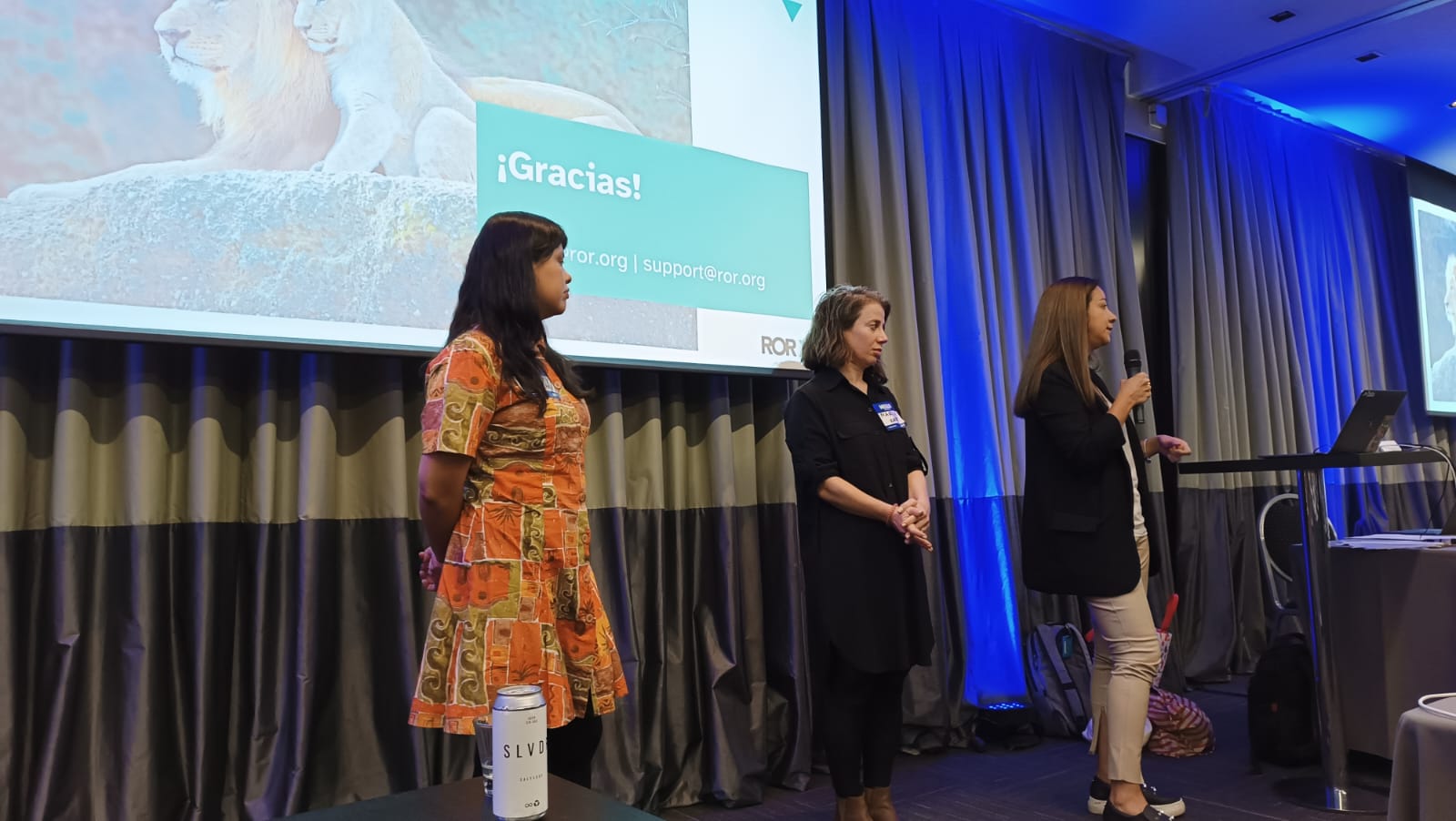
Panelists of the session PIDs as open research infrastructure (from left to right) Gabi Mejias (DataCite, Germany), Maria Gould (ROR, USA), Ana Cardoso (ORCID, Mexico).
The third and final series of presentations focused on specific implementations of persistent identifiers in Latin American research infrastructure. This session highlighted institutional use cases at the Universidad Nacional de Rosario in Argentina (Paola Carolina Bongiovani, Paulina Freán, Analía Salazar) and Universidad de Chile (Rodrigo Donoso) to implement persistent identifiers in library and repository systems, and examples of consortia-level implementations by Consortia from Colombia (Paula Saavedra) and eScire (Nydia Lopez and Joel Torres) from Mexico.
 (UNR, Argentina), [Paulina Frean](https://orcid.org/0000-0002-9710-0213) (UNR, Argentina), [Nydia López](https://orcid.org/0009-0007-3657-5817) (eScire, Mexico), [Joel Torres](https://orcid.org/0000-0001-6739-5906) (eScire, Mexico), [Paola Bongiovani](https://orcid.org/0000-0003-0049-9086) (UNR, Argentina), [Rodrigo Donoso Vegas](https://orcid.org/0000-0001-5635-4324) (Universidad de Chile, Chile), [Paula Saavedra](https://orcid.org/0000-0001-5383-3020) (Consortia, Colombia).](/img/blog/pidslatam/pidslatam-panel3.jpg)
Panelists of the session PIDs implementation in Latin America (from left to right) Analía Salazar (UNR, Argentina), Paulina Frean (UNR, Argentina), Nydia López (eScire, Mexico), Joel Torres (eScire, Mexico), Paola Bongiovani (UNR, Argentina), Rodrigo Donoso Vegas (Universidad de Chile, Chile), Paula Saavedra (Consortia, Colombia).
Review the Session 3 presentations
Paola Carolina Bongiovani, Paulina Freán, Analía Salazar, “Implementación de PIDs en América Latina REPOSITORIO DE DATOS ACADÉMICOS RDA-UNR dataverse.unr.edu.ar,” https://doi.org/10.5281/zenodo.7860470
Rodrigo Donoso Vegas, “Implementación PIDs en América Latina. Experiencia de la Universidad de Chile,” https://doi.org/10.5281/zenodo.7860501
Paula Saavedra Ochoa, “Gestión de identificadores persistentes consorciados,” https://doi.org/10.5281/zenodo.7860524
Nydia Lopez and Joel Torres, “Consorcio eSCIRE,” https://doi.org/10.5281/zenodo.7860513
At the conclusion of the program, audience members participated in an interactive brainstorming session to share their impressions about the state of PIDs implementations in Latin America and raise questions and ideas about how to move forward to achieve greater adoption. The participants responded to three prompts:
What would you like to see happen with PIDs in Latin America?
What are the challenges to PIDs adoption in the region?
What can we do to address these challenges?
In the responses to the online poll, several themes stood out: the importance of shared infrastructure and of collaboration, the necessity of making PIDs infrastructure more accessible, the value of having more training and capacity-building, and the ongoing need to continue raising awareness of how to work with PIDs and of the benefits they provide.
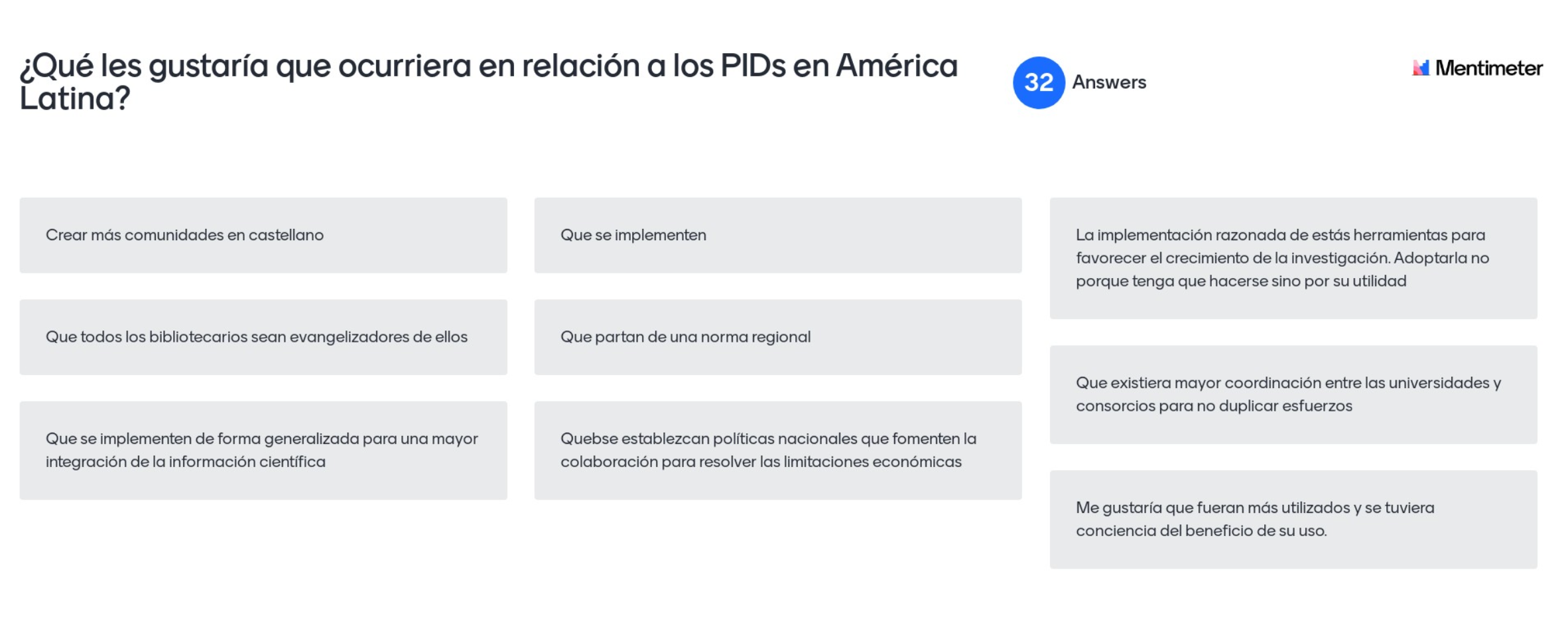
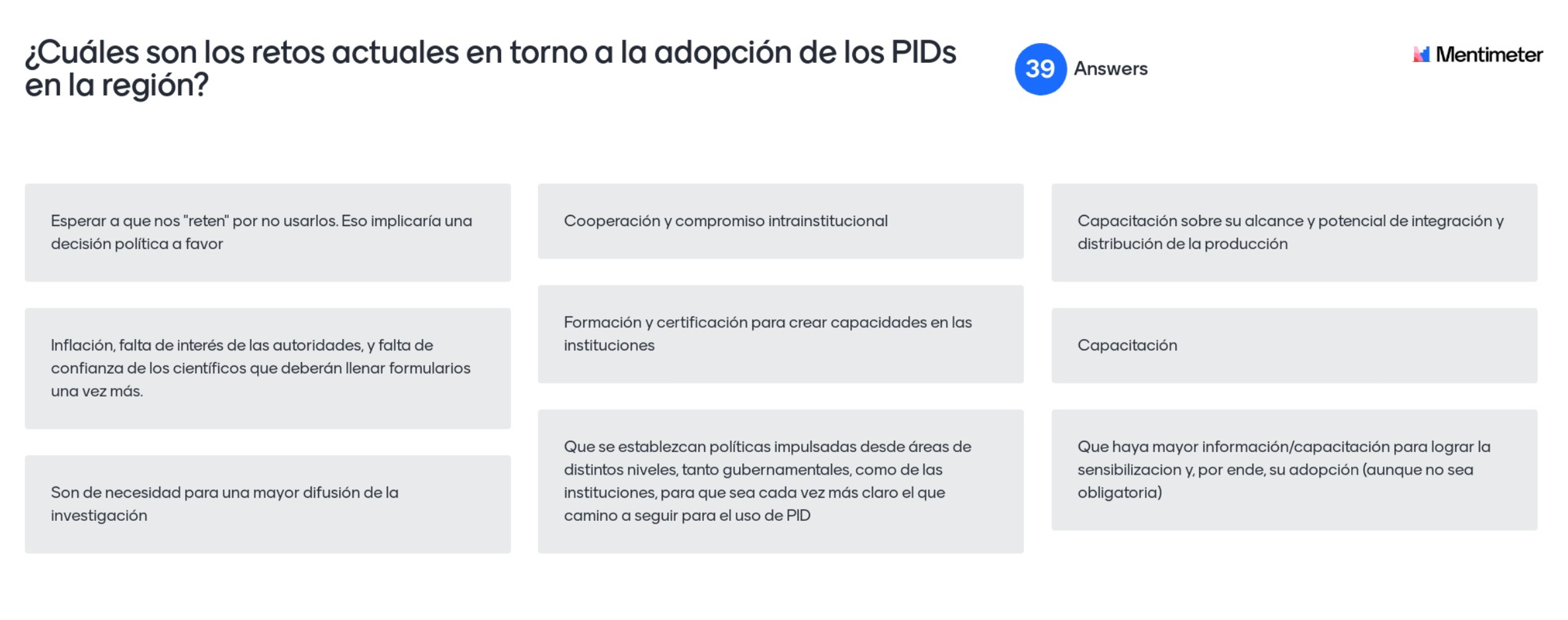
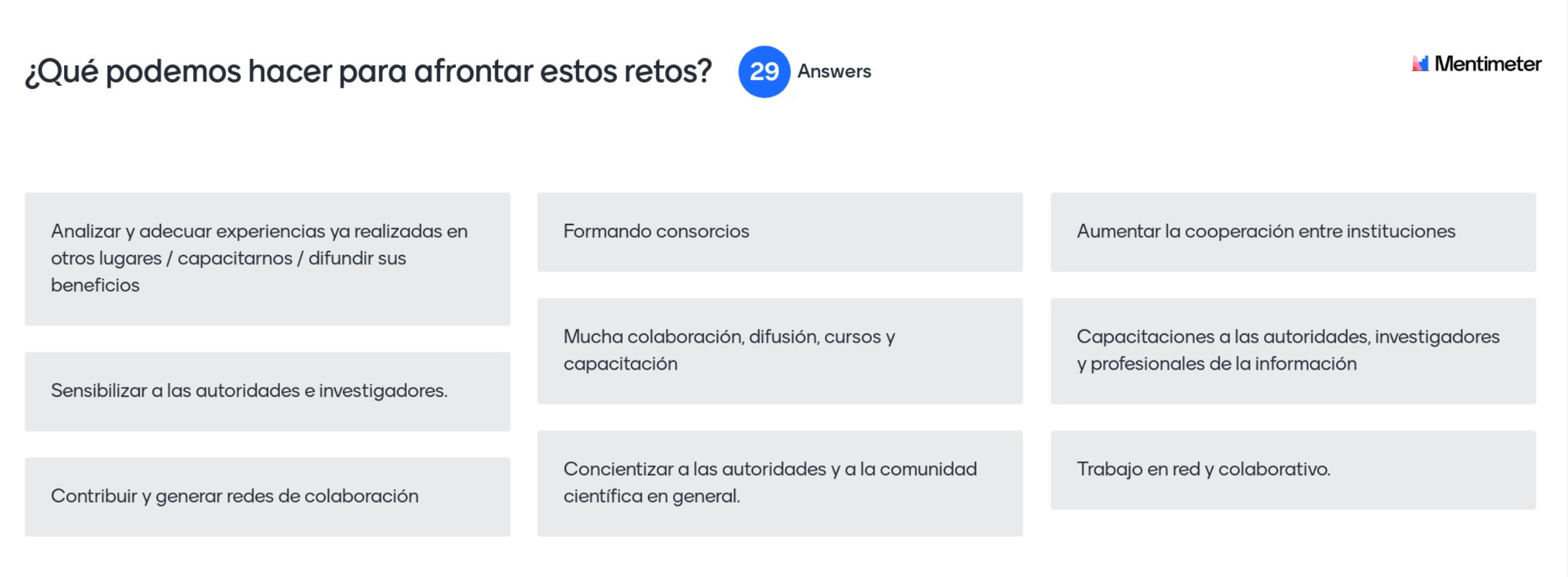
Throughout the day, the sessions and participant engagement demonstrated not only a high level of interest in the topic of PIDs and open science in Latin America, but also generated new ideas and opportunities for future collaborations and follow-up actions.
We at DataCite, ORCID, and ROR express our gratitude for the effusive response to this event and the satellite discussions that took place on the preceding and following days, all of which speak to the leading role that Latin America is playing in developing infrastructures, policies, and practices for promoting collaboration around open knowledge, redistributing global research networks, and making it possible for all countries to have greater access to science and technology. It was great to meet the Latin American community in person and we hope to continue working together to build an open and robust research infrastructure!
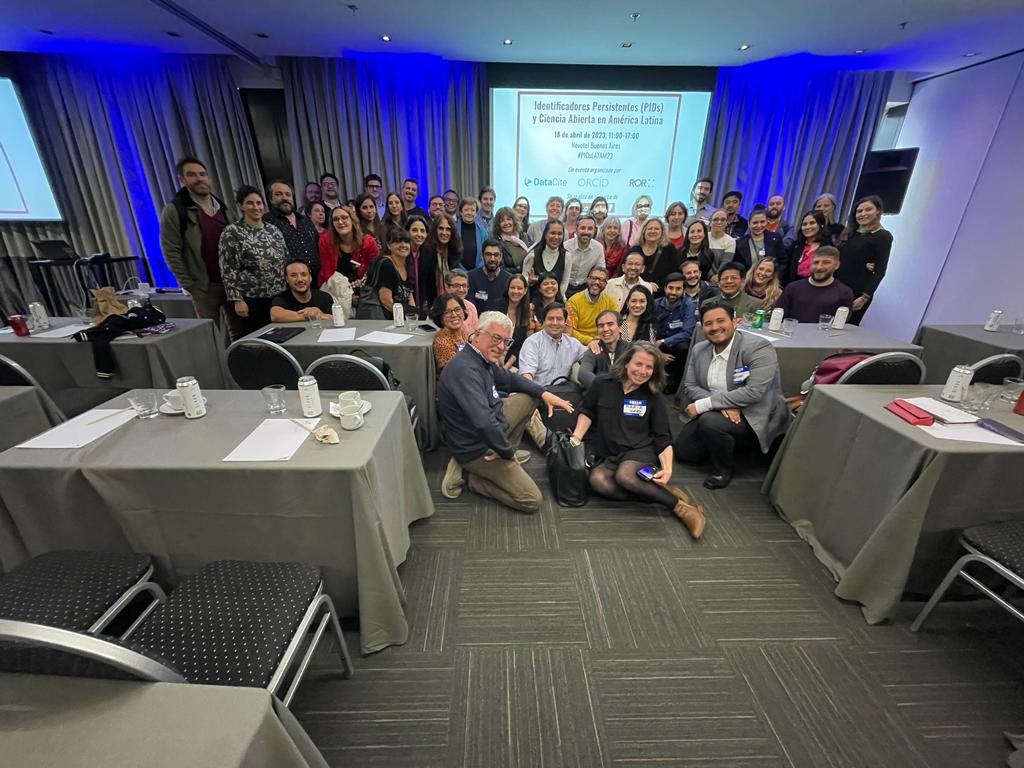
(Happy!) participants of the PIDs and open science in Latin America event.
PIDs y Ciencia Abierta: Construyendo comunidad en América Latina
Publicado a la vez por DataCite y ORCID
Los identificadores persistentes están jugando un papel clave en impulsar una infraestructura de investigación más sólida e iniciativas de ciencia abierta en América Latina. Este fue el tema principal del evento “Identificadores Persistentes (PIDs) y Ciencia Abierta en América Latina” (#PIDsLATAM23) realizado el 18 de abril en Buenos Aires (Argentina) en el marco de la de csv,conf,v7.
Organizado por DataCite, ORCID y ROR, el evento contó con más de 70 personas vinculadas a la investigación en América Latina y otras regiones, representando más de 40 instituciones diferentes.
, [Ana Cardoso](https://orcid.org/0000-0002-8631-3838), [Gabriela Mejias](https://orcid.org/0000-0002-1598-7181).](/img/blog/pidslatam/pidslatam-event-kickoff.jpg)
Inicio del evento: (de izquierda a derecha) Maria Gould, Ana Cardoso, Gabriela Mejias.
Dirigido a gestores de investigación, directores de bibliotecas y personal técnico, el programa de un día completo contó con una serie de presentaciones detalladas, todas en español, sobre cómo se implementan y utilizan los identificadores persistentes en entornos nacionales, consorciados e institucionales que apoyan el acceso abierto, la ciencia e incrementan la descubribilidad y visibilidad de la investigación en América Latina.
El objetivo fue presentar casos de uso e historias de éxito así como reunir a personas con intereses y desafíos en común en un espacio de habla hispana.
El primer grupo de presentaciones se centró en iniciativas a gran escala que tienen como objetivo promover la ciencia abierta a través de identificadores persistentes (PIDs). Gustavo Durand de The Dataverse Project expuso cómo se están implementando los PIDs en la plataforma para hacer que los datos de investigación y otros trabajos estén disponibles de manera más abierta; Abel del Carpio del CONCYTEC habló sobre la estrategia de la organización en el aprovechamiento de los PIDs en Perú; y Washington Segundo de IBICT y LA Referencia mostró los esfuerzos tanto de Brasil como de otras regiones en América Latina para desarrollar una infraestructura de ciencia abierta utilizando PIDs.
 (IBICT, Brasil), [Gustavo Durand](https://orcid.org/0000-0002-2188-2570) (Dataverse, USA), [Abel del Carpio](https://orcid.org/0000-0003-4469-6516) (CONCYTEC, Peru).](/img/blog/pidslatam/pidslatam-panel1.jpg)
Panelistas de la sesión PIDs y ciencia abierta (de izquierda a derecha) Washington Segundo (IBICT, Brasil), Gustavo Durand (Dataverse, USA), Abel del Carpio (CONCYTEC, Peru).
Presentaciones de la Sesión 1:
Gustavo Durand, “Dataverse y los PIDs”, https://doi.org/10.5281/zenodo.7860265
Abel del Carpio, “Plataformas de CTI y los identificadores persistentes (PIDs) en el Perú,” https://doi.org/10.5281/zenodo.7860287
Washington Segundo, “Los PIDs y la ciencia abierta: perspectiva Brasil y América Latina,” https://doi.org/10.5281/zenodo.7860279
El siguiente grupo de presentaciones se centró en los servicios de identificadores persistentes globales para construir una infraestructura de investigación más abierta e interoperable en América Latina y a nivel global, con DataCite (Gabi Mejias), ORCID (Ana Cardoso) y ROR (Maria Gould).
Presentaciones de la Sesión 2:
Gabi Mejias, “Conectando la investigación con DataCite,” https://doi.org/10.5281/zenodo.7860319
Ana Cardoso, “PIDs y ORCID,” https://doi.org/10.5281/zenodo.7860315
Maria Gould, “ROR, El Registro Abierto de Identificadores Persistentes para Organizaciones de Investigación,” https://doi.org/10.5281/zenodo.7860464

Panelistas de la sesión PIDs como infraestructura abierta de investigación (de izquierda a derecha) Gabi Mejias (DataCite, Alemania), Maria Gould (ROR, USA), Ana Cardoso (ORCID, México).
El tercer y último grupo de presentaciones se enfocó en las implementaciones y desarrollo de identificadores persistentes en la infraestructura de investigación de América Latina. Esta sesión destacó casos de uso institucional en la Universidad Nacional de Rosario en Argentina (Paola Carolina Bongiovani, Paulina Freán, Analía Salazar) y la Universidad de Chile (Rodrigo Donoso) para implementar identificadores persistentes en sistemas de bibliotecas y repositorios. Y por último se destacaron algunos ejemplos de implementaciones a nivel consorcial por Consortia de Colombia (Paula Saavedra) y eScire (Nydia López y Joel Torres) de México.
 (UNR, Argentina), [Paulina Frean](https://orcid.org/0000-0002-9710-0213) (UNR, Argentina), [Nydia López](https://orcid.org/0009-0007-3657-5817) (eScire, Mexico), [Joel Torres](https://orcid.org/0000-0001-6739-5906) (eScire, Mexico), [Paola Bongiovani](https://orcid.org/0000-0003-0049-9086) (UNR, Argentina), [Rodrigo Donoso Vegas](https://orcid.org/0000-0001-5635-4324) (Universidad de Chile, Chile), [Paula Saavedra](https://orcid.org/0000-0001-5383-3020) (Consortia, Colombia).](/img/blog/pidslatam/pidslatam-panel3.jpg)
Panelistas de la sesión Implementación de PIDs en América Latina (de izquierda a derecha) Analía Salazar (UNR, Argentina), Paulina Frean (UNR, Argentina), Nydia López (eScire, Mexico), Joel Torres (eScire, Mexico), Paola Bongiovani (UNR, Argentina), Rodrigo Donoso Vegas (Universidad de Chile, Chile), Paula Saavedra (Consortia, Colombia).
Presentaciones de la Sesión 3:
Paola Carolina Bongiovani, Paulina Freán, Analía Salazar, “Implementación de PIDs en América Latina REPOSITORIO DE DATOS ACADÉMICOS RDA-UNR dataverse.unr.edu.ar,” https://doi.org/10.5281/zenodo.7860470
Rodrigo Donoso Vegas, “Implementación PIDs en América Latina. Experiencia de la Universidad de Chile,” https://doi.org/10.5281/zenodo.7860501
Paula Saavedra Ochoa, “Gestión de identificadores persistentes consorciados,” https://doi.org/10.5281/zenodo.7860524
Nydia López y Joel Torres, “Consorcio eSCIRE”, https://doi.org/10.5281/zenodo.7860513
Ya para finalizar la agenda, los miembros de la audiencia participaron en una sesión interactiva de lluvia de ideas (brainstorming) para compartir sus impresiones sobre el estado de las implementaciones de PIDs en América Latina y plantear preguntas e ideas sobre cómo avanzar para lograr una mayor adopción. Los participantes respondieron a tres preguntas:
¿Qué te gustaría que sucediera con los PIDs en América Latina?
¿Cuáles son los desafíos para la adopción de PIDs en la región?
¿Qué crees que podemos hacer para abordar estos desafíos?
En las respuestas a la encuesta en línea, se resaltaron varios temas: la importancia de la infraestructura compartida y de la colaboración, la necesidad de hacer que la infraestructura de PIDs sea más accesible, el valor de tener más capacitación y desarrollo de capacidades, y la necesidad constante de continuar creando conciencia de cómo trabajar con PIDs y de los beneficios que estos brindan.



A lo largo del día, las sesiones y la participación de los asistentes demostraron no solo un gran nivel de interés en el tema de los PIDs y la ciencia abierta en América Latina, sino que también generaron nuevas ideas y oportunidades para futuras colaboraciones y acciones de seguimiento.
Desde DataCite, ORCID y ROR expresamos nuestro agradecimiento por la positiva y efusiva respuesta a este evento y las discusiones satélite que tuvieron lugar en los días anteriores y posteriores, todo lo cual habla del papel de liderazgo que está jugando América Latina en el desarrollo de infraestructuras, políticas y prácticas para promover la colaboración en torno al conocimiento abierto, redistribuir las redes globales de investigación y hacer posible que todos los países tengan un mayor acceso a la ciencia y la tecnología. ¡Fue increíble conocer a la comunidad latinoamericana en persona y esperamos seguir trabajando juntos para construir una infraestructura de investigación abierta y sólida en la región!

Participantes (¡Felices!) del evento PIDs y ciencia abierta en América Latina.
RSS Feed
Categories
Archives
Tags
- adoption
- annual-meeting
- api
- aps
- caltechdata
- clarivate
- clear-skies
- coki
- communication
- community
- cross-post
- crossref
- curation
- data
- datacite
- datasalon
- development
- dryad
- europepmc
- facilities
- fairsharing
- feedback
- figshare
- funders
- governance
- grei
- grid
- hierarchy
- implementation
- integrations
- interviews
- inveniordm
- jobs
- latin-america
- machine-learning
- matching
- metadata
- mvr
- open-access
- open-infrastructure
- openalex
- optica
- orcid
- osf
- persistent-identifiers
- pidapalooza
- pids
- prototype
- publishers
- publishing
- registry
- research-integrity
- researchequals
- resources
- rockefeller-university-press
- rrid
- schema
- scholastica
- silverchair
- steering-group
- straininfo
- sustainability
- team
- web-of-science
- working-group
- zenodo